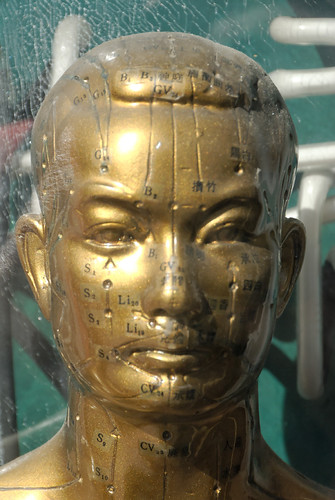 Over the years, I have been fortunate to have practiced alongside a broad range of clinicians - be they acupuncturists, chiropractors, orthopedists, physical therapists, naturopaths, osteopaths, and doctors of oriental medicine. Each profession lends some intriguing and practical perspectives on patient care. In the same breathe, each profession also has their share of lousy practitioners. You will find that quacks and charlatans are not exclusive to the world of alternative therapies, nor is lack of evidence-based practice limited to Eastern medicine.
Over the years, I have been fortunate to have practiced alongside a broad range of clinicians - be they acupuncturists, chiropractors, orthopedists, physical therapists, naturopaths, osteopaths, and doctors of oriental medicine. Each profession lends some intriguing and practical perspectives on patient care. In the same breathe, each profession also has their share of lousy practitioners. You will find that quacks and charlatans are not exclusive to the world of alternative therapies, nor is lack of evidence-based practice limited to Eastern medicine.
There are many that swear by the benefits of Eastern medicine. They will tell you that Western medicine has failed the patient. They will tell you that it (Eastern medicine) has stood the test of time.
On the flip side of the discussion, the proponents of Western medicine will tell you that Eastern medicine has little scientific evidence and has not been subjected to the rigors of the scientific method.
They are in a parallel universe. Perhaps both sides of that coin are correct.
I have been a strong advocate of evidence-based practice for many years. I believe that regardless of your professional training and background, we are all obligated – ethically and clinically – to provide the best evidence-based care to our patients.
Eastern and Western medicine have some intriguing parallels between them, even though there appears to be a huge chasm ideologically that separates them:
Lack of a “big picture” of health: Systems thinking is almost impossible to find in Western medicine. As I would always say, if you wear pink sunglasses, everything looks pink. When you have greater and greater degrees of specialization, you miss the forest for the trees. As an example, if you are a surgeon, you see the world through those glasses. You see the world in terms of performing surgery to attain success. Likewise, if you are trained in oriental medicine, you see the world through those glasses alone.
But has either side really applied a true “systems” approach to health that is based in physiological mechanisms and systems thinking? I would suggest that the answer is no. There is an inherent tendency to view the patient from a limited perspective, and this ultimately has a negative impact on the care of the patient.
Lack of evidence-based practice: Proponents of Western medicine point their fingers at Eastern medicine. They claim that there is little scientific evidence to support their practices. But those that live in glass houses shouldn’t throw stones. For all of their claims, Western medicine practitioners continue to either use treatments that have little to no scientific evidence, or they ignore what evidence exists – or both.
Let’s face it – there is a lack of evidence-based practice in both Western and Eastern medicine. There needs to be a critical assessment of any and all approaches to care, and the scientific method needs to be the common language.
Belief systems drive treatment, not evidence: The debate over treatment approaches can become emotional and territorial. The practitioner may have spent many years and a lot of money learning their trade - how could they be wrong with all that training?
It is my belief, as a clinician, coach, and participant, that the primary limiter of advancement of both health are and coaching, human performance and injury prevention is the inability to challenge our belief systems in the face of good scientific evidence.
Our perceptions are our reality. If we choose to believe something, then it is so. Many rarely test their perceptions, simply opting to find any information that supports what they already believe to be true. This can be seen in both Eastern and Western approaches to care.
Influence of the placebo effect: If you believe you are getting better, amazingly enough, it tends to happen. If you believe that your practitioner is helping you – Eastern medicine or Western medicine alike – then you tend to get better. Many would call it a “cult of personality”. The research would call it “the placebo effect”. We know without question that the placebo effect can play a huge role in patient care and outcome – Eastern or Western care alike.
There are quite a number of similarities between Eastern and Western medicine. Perhaps there will come a time when both universes come together as one, and evidence and the scientific method drives the discussion.
Photo credits: Tony Rodd

 "Running Injuries: Etiology And Recovery- Based Treatment" (co-author Bridget Clark, PT) appears in the third edition and fourth editions of "Clinical Orthopaedic Rehabilitation: A Team Approach" by Charles Giangarra, MD and Robert C. Manske, PT.
"Running Injuries: Etiology And Recovery- Based Treatment" (co-author Bridget Clark, PT) appears in the third edition and fourth editions of "Clinical Orthopaedic Rehabilitation: A Team Approach" by Charles Giangarra, MD and Robert C. Manske, PT.
 Allan Besselink, PT, DPT, Ph.D., Dip.MDT has a unique voice in the world of sports, education, and health care. Read more about Allan here.
Allan Besselink, PT, DPT, Ph.D., Dip.MDT has a unique voice in the world of sports, education, and health care. Read more about Allan here.
 Top 5 finalist in three categories: "Best Overall Blog", "Best PT Blog" and "Best Advocacy Blog".
Top 5 finalist in three categories: "Best Overall Blog", "Best PT Blog" and "Best Advocacy Blog".